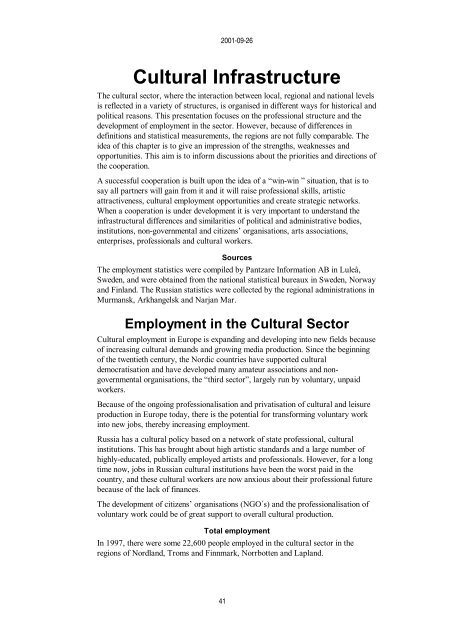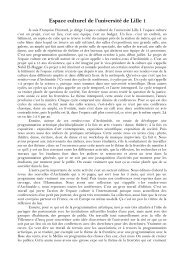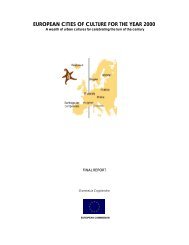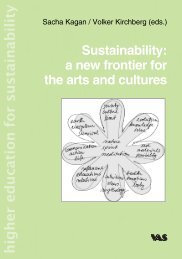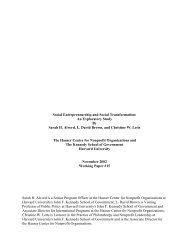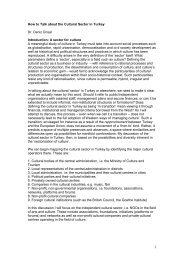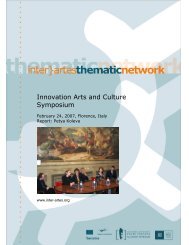Report on The Barents Cultural Co-operation - LabforCulture.org
Report on The Barents Cultural Co-operation - LabforCulture.org
Report on The Barents Cultural Co-operation - LabforCulture.org
Create successful ePaper yourself
Turn your PDF publications into a flip-book with our unique Google optimized e-Paper software.
2001-09-26<br />
<strong>Cultural</strong> Infrastructure<br />
<strong>The</strong> cultural sector, where the interacti<strong>on</strong> between local, regi<strong>on</strong>al and nati<strong>on</strong>al levels<br />
is reflected in a variety of structures, is <strong>org</strong>anised in different ways for historical and<br />
political reas<strong>on</strong>s. This presentati<strong>on</strong> focuses <strong>on</strong> the professi<strong>on</strong>al structure and the<br />
development of employment in the sector. However, because of differences in<br />
definiti<strong>on</strong>s and statistical measurements, the regi<strong>on</strong>s are not fully comparable. <strong>The</strong><br />
idea of this chapter is to give an impressi<strong>on</strong> of the strengths, weaknesses and<br />
opportunities. This aim is to inform discussi<strong>on</strong>s about the priorities and directi<strong>on</strong>s of<br />
the cooperati<strong>on</strong>.<br />
A successful cooperati<strong>on</strong> is built up<strong>on</strong> the idea of a “win-win ” situati<strong>on</strong>, that is to<br />
say all partners will gain from it and it will raise professi<strong>on</strong>al skills, artistic<br />
attractiveness, cultural employment opportunities and create strategic networks.<br />
When a cooperati<strong>on</strong> is under development it is very important to understand the<br />
infrastructural differences and similarities of political and administrative bodies,<br />
instituti<strong>on</strong>s, n<strong>on</strong>-governmental and citizens’ <strong>org</strong>anisati<strong>on</strong>s, arts associati<strong>on</strong>s,<br />
enterprises, professi<strong>on</strong>als and cultural workers.<br />
Sources<br />
<strong>The</strong> employment statistics were compiled by Pantzare Informati<strong>on</strong> AB in Luleå,<br />
Sweden, and were obtained from the nati<strong>on</strong>al statistical bureaux in Sweden, Norway<br />
and Finland. <strong>The</strong> Russian statistics were collected by the regi<strong>on</strong>al administrati<strong>on</strong>s in<br />
Murmansk, Arkhangelsk and Narjan Mar.<br />
Employment in the <strong>Cultural</strong> Sector<br />
<strong>Cultural</strong> employment in Europe is expanding and developing into new fields because<br />
of increasing cultural demands and growing media producti<strong>on</strong>. Since the beginning<br />
of the twentieth century, the Nordic countries have supported cultural<br />
democratisati<strong>on</strong> and have developed many amateur associati<strong>on</strong>s and n<strong>on</strong>governmental<br />
<strong>org</strong>anisati<strong>on</strong>s, the “third sector”, largely run by voluntary, unpaid<br />
workers.<br />
Because of the <strong>on</strong>going professi<strong>on</strong>alisati<strong>on</strong> and privatisati<strong>on</strong> of cultural and leisure<br />
producti<strong>on</strong> in Europe today, there is the potential for transforming voluntary work<br />
into new jobs, thereby increasing employment.<br />
Russia has a cultural policy based <strong>on</strong> a network of state professi<strong>on</strong>al, cultural<br />
instituti<strong>on</strong>s. This has brought about high artistic standards and a large number of<br />
highly-educated, publically employed artists and professi<strong>on</strong>als. However, for a l<strong>on</strong>g<br />
time now, jobs in Russian cultural instituti<strong>on</strong>s have been the worst paid in the<br />
country, and these cultural workers are now anxious about their professi<strong>on</strong>al future<br />
because of the lack of finances.<br />
<strong>The</strong> development of citizens’ <strong>org</strong>anisati<strong>on</strong>s (NGO´s) and the professi<strong>on</strong>alisati<strong>on</strong> of<br />
voluntary work could be of great support to overall cultural producti<strong>on</strong>.<br />
Total employment<br />
In 1997, there were some 22,600 people employed in the cultural sector in the<br />
regi<strong>on</strong>s of Nordland, Troms and Finnmark, Norrbotten and Lapland.<br />
41


